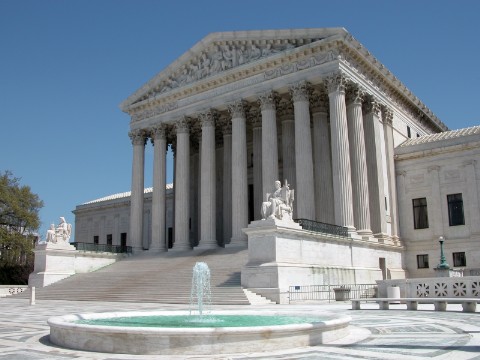The Supreme Court this week ruled unanimously to throw out the ACLU’s tort law claim against former Attorney General John Ashcroft, finding that he was entitled to qualified immunity from suit. It did not take long, however, for ACLUers to begin asserting that their loss contained numerous silver linings which did not let senior government officials completely off the hook. They pointed to several of the Court’s concurring opinions as their source of hope.
Those hopes are misplaced. A majority of the Justices made clear that tort claims of the sort asserted against Ashcroft have no chance of success. Justice Anthony Kennedy, who authored one of the concurring opinions, signed on to the Court’s opinion in full – meaning that Justice Scalia’s majority opinion (not the separately expressed views of Justices Ginsburg, Breyer, and Sotomayor) is the Court’s definitive statement regarding the Fourth Amendment issues at stake. Moreover, Kennedy’s concurring opinion said nothing that undercuts the sweeping nature of Scalia’s qualified immunity decision.
The case involved Abdullah Al-Kidd, an American citizen who was detained in 2003 for 15 days as a material witness in a pending criminal case. Al-Kidd claimed that he was detained not because the federal government wanted to ensure the availability of his testimony, but because it suspected his involvement in terrorist activity. He argued that the Fourth Amendment prohibited such detention in the absence of evidence of wrongdoing sufficient to meet the “probable cause” standard. He sought to have Ashcroft held personally liable for the decision of line prosecutors to employ the Material Witness Statute in this allegedly unconstitutional manner, on the grounds that those actions supposedly were induced by policies adopted by the Ashcroft Justice Department.
The majority opinion cited two separate bases for dismissing the suit at the pleadings stage. First, it held that the Fourth Amendment does not concern itself with a prosecutor’s subjective reasons for detaining a material witness. So long as the objective criteria set forth in the Material Witness Statute have been met (and Al-Kidd conceded they had been met in this case), there can be no constitutional violation, regardless what may have motivated prosecutors. Second, it held that in any event Ashcroft was entitled to qualified immunity because at the time he acted, no federal court decisions provided clear notice that the Fourth Amendment prohibited prosecutors from invoking the Material Witness Statute for the purpose of detaining suspected terrorists. On this second point, all eight Justices agreed (with Justice Kagan recused).
Justice Kennedy’s concurring opinion did not seek to limit or explain away any portion of the majority decision. His concurring opinion observed that although the Court did not need to resolve whether the affidavit submitted by prosecutors in connection with their effort to obtain an arrest warrant for Al-Kidd met the requirements of the Material Witness Statute (because Al-Kidd had conceded the point), there were some grounds to conclude that the affidavit was insufficient. The Material Witness Statute requires prosecutors seeking an arrest warrant to demonstrate that: (1) the person’s testimony is “material” to an ongoing criminal proceeding; and (2) it may be “impracticable” to secure his presence by subpoena. Kennedy wrote that it was “unclear” whether the “impracticable” standard was met in this case based solely on evidence that Al-Kidd was planning a trip outside the country, particularly given his alleged willingness to testify if asked.
At most, Kennedy’s statement might be seen as advice to federal magistrates to examine prosecutors’ evidence very closely before issuing arrest warrants, to ensure that the terms of the Material Witness Statute have been met. Nothing in his concurrence suggests that the Supreme Court might have ruled differently on the tort claim had Al-Kidd demonstrated that the terms of the Statute had not been met (and thus that a warrant should not have been issued). He gave no hint that there could be any basis for liability in the absence of evidence that Ashcroft encouraged prosecutors to provide false evidence to the magistrate. Both the majority opinion and Kennedy’s concurrence make quite clear that in the absence of fraud, federal officials cannot be held personally accountable when an independent magistrate determines that the conditions for issuance of an arrest warrant have been met – even if another court later disagrees with that determination. And given that Ashcroft and other senior Justice Department officials played no role in drawing up the affidavit in this case, they cannot plausibly be accused of fraud.
The Ashcroft decision was a total loss for those who seek to file tort claims against senior Justice Department officials as a means of affecting departmental policy. Indeed, attorneys who file future suits of this sort might well find themselves subject to sanction for filing frivolous litigation.

